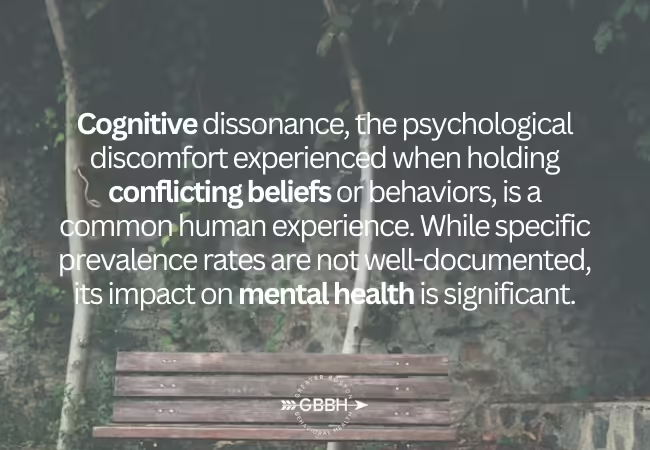Cognitive dissonance is a psychological phenomenon where an individual experiences discomfort or inner conflict due to holding contradictory beliefs, values, or attitudes simultaneously. It can lead to stress, anxiety, and even mental health challenges if left unaddressed. However, understanding and managing cognitive dissonance can significantly improve emotional resilience and overall well-being.
At Greater Boston Behavioral Health, we recognize the importance of addressing cognitive dissonance through tailored therapies and support systems. From Anger Management Therapy to Anxiety Treatment Programs, our holistic approach helps individuals reconcile conflicting beliefs and regain mental clarity. This guide explores cognitive dissonance, its impact, and how our programs in Boston behavioral health can help.
What Is Cognitive Dissonance?
Cognitive dissonance occurs when there is a conflict between what a person believes and how they act, or between two competing beliefs. This misalignment creates psychological discomfort, prompting individuals to seek ways to resolve or reduce the tension.
Examples of Cognitive Dissonance:
- Smoking and Health Awareness:
A person who smokes may know that smoking is harmful to their health, yet continues the habit, rationalizing it by saying, “I’ll quit eventually” or “It helps me relax.” - Work-Life Balance:
A professional who values family time but works excessive hours may justify it by believing their hard work is for the family’s benefit, despite missing out on quality time. - Diet and Exercise Goals:
Someone aiming for a healthier lifestyle but frequently indulging in junk food may rationalize their actions by thinking, “I’ll start fresh tomorrow.”
The Psychology Behind Cognitive Dissonance
Cognitive dissonance arises from the brain’s innate desire for consistency and balance. When faced with conflicting thoughts or behaviors, the mind attempts to resolve the tension to restore harmony.
How Cognitive Dissonance Impacts Mental Health
- Increased Stress and Anxiety: Unresolved dissonance can lead to chronic stress, contributing to mental health challenges like anxiety or depression.
- Avoidance Behavior: Individuals may avoid situations or information that highlight the conflict, leading to denial or procrastination.
- Reduced Self-Esteem: Persistent dissonance can cause feelings of guilt, shame, or inadequacy.
Our Mental Health Treatment Programs focus on helping clients identify and resolve cognitive dissonance, promoting emotional stability and improved self-awareness.
Signs of Cognitive Dissonance
Cognitive dissonance may manifest in subtle or obvious ways, depending on the individual and the conflict they are experiencing. Recognizing these signs is the first step toward addressing the issue.
Common Symptoms:
- Emotional Discomfort: Feeling uneasy, stressed, or anxious without clear reasons.
- Self-Justification: Making excuses to align actions with beliefs.
- Avoidance: Ignoring or dismissing information that challenges current beliefs.
- Guilt or Shame: Feeling bad about actions that contradict personal values.
- Decision Paralysis: Struggling to make choices due to conflicting thoughts.
If you’re experiencing these symptoms, seeking help from a Mental Health Treatment Center in Boston can provide the guidance needed to address and resolve these conflicts.
How Cognitive Dissonance Affects Behavioral Health
Cognitive dissonance can have far-reaching effects on behavioral health, influencing decision-making, relationships, and overall mental well-being. Addressing this conflict is particularly important in managing conditions such as anxiety, depression, and anger issues.
1. Impact on Relationships
Cognitive dissonance can strain relationships when individuals feel conflicted about their behaviors or beliefs in relation to loved ones. For example:
- A person who values honesty but withholds information from a partner may feel guilt and anxiety, impacting communication.
Programs like our Family Therapy Program help individuals and families navigate these conflicts, fostering understanding and healthier interactions.
2. Influence on Emotional Regulation
Unresolved dissonance often triggers emotional outbursts or suppression, leading to challenges like anger or frustration.
- Anger Management Therapy at Greater Boston Behavioral Health helps clients recognize triggers and manage emotional responses constructively.
3. Connection to Mental Health Conditions
Persistent cognitive dissonance can contribute to or exacerbate mental health conditions like anxiety and depression.
- Our Anxiety Treatment Program and Depression Treatment Program integrate strategies to help clients process and resolve conflicting beliefs, reducing stress and promoting emotional resilience.

Addressing Cognitive Dissonance: Strategies and Solutions
Resolving cognitive dissonance requires intentional effort, self-awareness, and often, external support. While the discomfort it causes can be overwhelming, it also serves as a motivator for change. By implementing targeted strategies, individuals can address cognitive dissonance and reduce its impact on their mental health.
1. Building Self-Awareness
Understanding and acknowledging the existence of cognitive dissonance is the first step toward resolving it. This process involves identifying the conflicting beliefs or actions causing discomfort.
How to Build Self-Awareness:
- Mindfulness Exercises: Practices like meditation and mindfulness help individuals observe their thoughts and behaviors without judgment.
- Journaling: Writing down conflicting thoughts, beliefs, or actions provides clarity and reveals patterns.
- Therapy Sessions: Professional guidance from a therapist can uncover hidden conflicts and provide insights into their origins.
2. Adjusting Beliefs or Behaviors
Cognitive dissonance is resolved by changing either the conflicting belief or the behavior. Depending on the situation, one may be easier or more practical than the other.
Examples:
- Behavioral Adjustment: If a person values environmental sustainability but uses disposable plastics, they can switch to reusable items to align with their beliefs.
- Belief Adjustment: If changing behavior isn’t feasible, reframing beliefs can help. For instance, acknowledging the limitations of one’s circumstances may reduce guilt.
3. Developing Healthy Coping Mechanisms
Cognitive dissonance can create significant emotional distress. Learning to manage these emotions is essential for reducing their impact.
Effective Coping Strategies:
- Cognitive Restructuring: Replace negative self-talk with constructive, compassionate thoughts.
- Emotional Regulation Techniques: Practices like deep breathing, grounding exercises, and progressive muscle relaxation can help manage stress.
- Engaging in Positive Activities: Physical exercise, creative hobbies, or connecting with others can provide a mental reset.
4. Seeking Professional Support
Therapy offers a structured environment for addressing cognitive dissonance. A therapist can guide individuals through exploring conflicts, understanding their roots, and finding effective resolutions.
Therapeutic Approaches:
- Cognitive Behavioral Therapy (CBT): Focuses on identifying and changing irrational thoughts and beliefs.
- Group Therapy Programs: Provides peer support and shared strategies for overcoming similar challenges.
- Family Therapy Program: Addresses dissonance arising from family dynamics, fostering better communication and mutual understanding.
Therapy and Cognitive Dissonance: The Role of Greater Boston Behavioral Health
At Greater Boston Behavioral Health, we provide a range of therapies to address cognitive dissonance and its impact on behavioral health. Our tailored programs help clients navigate their conflicts and build healthier mental frameworks.
Key Services:
- Mental Health Therapy Programs: Individualized therapy to address specific conflicts and promote emotional clarity.
- Family Therapy Program: Resolving relational conflicts caused by cognitive dissonance within family dynamics.
- Group Therapy Program: Facilitating peer support to tackle shared challenges.
By combining evidence-based practices with compassionate care, we empower individuals to overcome cognitive dissonance and achieve greater mental well-being.
The Benefits of Resolving Cognitive Dissonance
Resolving cognitive dissonance can transform an individual’s mental and emotional health. It paves the way for greater self-awareness, healthier relationships, and a more fulfilling life.
1. Reduced Emotional Distress
Living with unresolved cognitive dissonance can lead to chronic stress, anxiety, and emotional turmoil. Addressing these conflicts alleviates these feelings, providing mental relief.
How It Helps:
- Lowers cortisol levels and reduces physical symptoms of stress.
- Improves mood and overall emotional well-being.
- Creates a sense of peace and internal alignment.
2. Improved Decision-Making
When cognitive dissonance is resolved, individuals gain clarity and confidence in their choices. This leads to better decision-making and reduces the risk of regret or second-guessing.
Benefits of Clearer Decision-Making:
- Increases confidence in personal and professional decisions.
- Helps prioritize long-term goals over short-term gratification.
- Reduces impulsivity by fostering thoughtful, deliberate choices.
3. Strengthened Relationships
Unresolved cognitive dissonance can strain relationships, particularly when it involves conflicts of interest or values with others. Addressing these issues leads to stronger, healthier connections.
Relationship Benefits:
- Enhances communication and mutual understanding.
- Builds trust by aligning actions with values.
- Resolves recurring conflicts, fostering a more harmonious environment.
Programs like the Family Therapy Program at Greater Boston Behavioral Health provide a safe space for addressing relational dissonance, helping families grow stronger together.
4. Boosted Self-Esteem and Confidence
Living in alignment with one’s values reinforces a positive self-image. Resolving cognitive dissonance empowers individuals to live authentically and embrace their true selves.
How It Improves Self-Perception:
- Fosters a sense of integrity and personal accountability.
- Reinforces the belief in one’s ability to make positive changes.
- Reduces feelings of guilt, shame, or inadequacy.
5. Long-Term Mental Health Benefits
Addressing cognitive dissonance not only improves immediate well-being but also supports long-term mental health. It helps individuals develop healthier thought patterns and coping mechanisms, reducing the likelihood of future conflicts.
Sustainable Benefits:
- Enhances resilience in facing new challenges.
- Promotes proactive problem-solving and adaptability.
- Reduces the risk of anxiety and depression stemming from unresolved inner conflicts.
Conclusion
Cognitive dissonance is a common yet manageable challenge that can impact mental health, relationships, and daily life. Understanding and addressing these conflicts is essential for achieving emotional clarity and well-being. At Greater Boston Behavioral Health, we offer comprehensive care through programs like Anger Management Therapy, Anxiety Treatment Programs, and Family Therapy Programs, ensuring individuals and families receive the support they need to thrive.
If you or someone you know is struggling with cognitive dissonance or related mental health concerns, contact our Mental Health Treatment Center in Boston today. Call us at (888)278-0716 today to learn more about our services and how we can help you on your journey to recovery!
FAQ on Cognitive Dissonance
How does cognitive dissonance affect mental health?
Unresolved cognitive dissonance can lead to stress, anxiety, guilt, and low self-esteem, negatively impacting overall mental health and emotional well-being.
What are some common signs of cognitive dissonance?
Common signs include emotional discomfort, self-justification, avoidance of challenging information, guilt, and decision paralysis.
Can therapy help resolve cognitive dissonance?
Yes, therapies like Cognitive Behavioral Therapy (CBT), family therapy, and group therapy are effective in addressing and resolving cognitive dissonance.
How does Greater Boston Behavioral Health help with cognitive dissonance?
We offer a range of evidence-based programs, including Mental Health Therapy Programs, Family Therapy Program, and Group Therapy Program, to help individuals identify and resolve conflicts, improve mental clarity, and enhance well-being.

